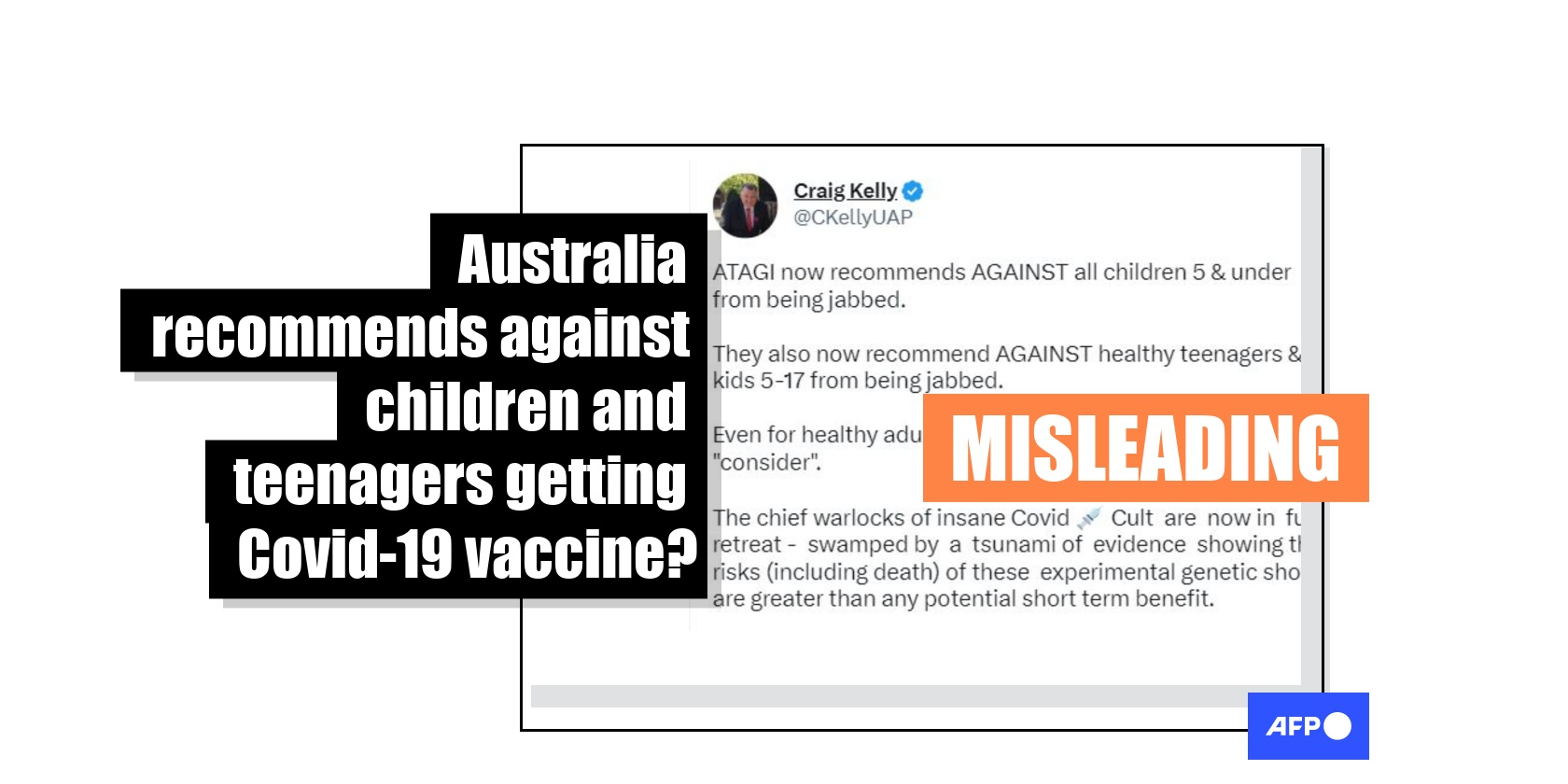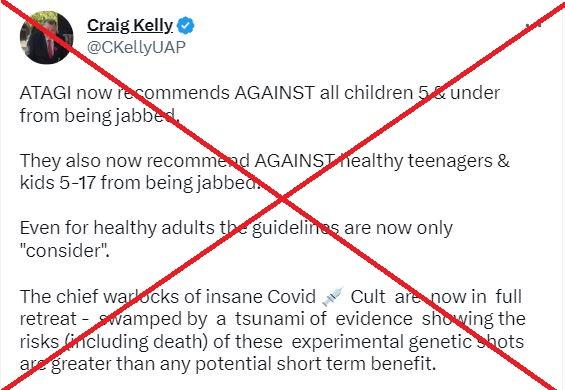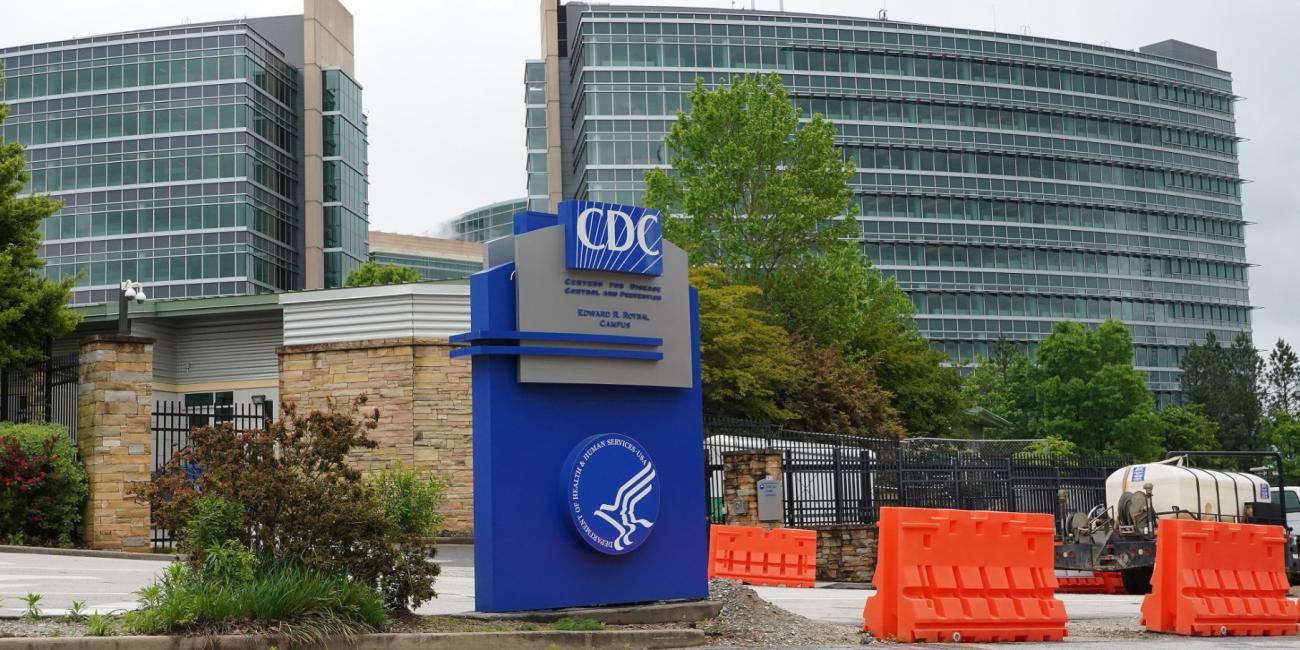
Australian conservative politician misleads on updated Covid-19 booster advice
- This article is more than two years old.
- Published on April 2, 2023 at 11:11
- 3 min read
- By Kate TAN, AFP Australia
"ATAGI now recommends AGAINST all children 5 & under from being jabbed," tweeted Craig Kelly, a former member of the Australian House of Representatives who has since joined mining magnate Clive Palmer's United Australia Party.
His March 21 post continued: "They also now recommend AGAINST healthy teenagers & kids 5-17 from being jabbed. Even for healthy adults the guidelines are now only 'consider'.
"The chief warlocks of insane Covid Cult are now in full retreat -- swamped by a tsunami of evidence showing the risks (including death) of these experimental genetic shots are greater than any potential short term benefit."
The post, retweeted more than 1,500 times, includes a link and a screenshot of the ATAGI's new booster advice that was published on February 8.

A similar misleading claim was also shared hundreds of times on Facebook here and here by users who falsely suggested Covid-19 vaccines were not safe for children or adults.
Misrepresented advice
As of April 1, 2023, the ATAGI has not recommended against children aged under five years old from getting vaccinated for Covid-19.
It has continued to recommend vaccination to children in this age group with health conditions that may increase the risks of severe Covid-19, according to its website.
The ATAGI has also not reversed its recommendation for children aged between five and 17 to receive a primary course of Covid-19 vaccines, which consists of two or three doses depending on individual circumstances.
A spokesperson for the Department of Health and Aged Care, which governs the ATAGI, told AFP on March 30: "Overall, severe Covid-19 in children is extremely rare, even among children with underlying conditions."
He said healthy adolescents aged 16 to 17 were previously recommended to receive a booster, but the advice changed in early February as "many young people in Australia have already been infected with Covid-19".
According to the ATAGI's latest advice, a booster vaccine is not recommended for children and adolescents aged 18 years or under who do not have any risk factors for severe Covid-19.
The spokesperson added that the ATAGI made the booster decision by considering the risk factors for myocarditis and pericarditis -- rare adverse effects related to Covid-19 vaccines -- following vaccination.
The ATAGI's advice also states adolescents and younger adults have a lower age-related risk of severe Covid-19 and a comparatively higher risk of myocarditis following vaccination.
"The risk of myocarditis is highest in people aged 16-30 years (peak 16-18 years), and is higher in males than females," the advice reads.
Catherine Bennett, a professor of epidemiology at Deakin University, told AFP that the updated advice on booster jabs reflected the high levels of infection among young people.
"A booster dose is not going to offer much to young adults who have the highest infection rates," she said. "The (re)infections boost their immunity, so the booster may not add a whole lot more on top of that."
Paul Griffin, director of infectious diseases at Mater Health Services in Brisbane, told AFP that adverse effects such as myocarditis have been recorded at a higher rate in young male adults but they were very rare.
"It's clear that the vaccine is safe and highly effective," he said.
Griffin went on to say that the ATAGI's new recommendation about booster vaccines was "not a retreat".
He said the ATAGI's updated advice "actually shows the strength of recommendation of the ATAGI", which made decisions when the epidemiology of the virus changes.
He said children and younger group who had a primary course or past infection have a low rate of developing severe diseases from Covid-19, so there was "no need for a booster at this point".
AFP has previously debunked misinformation shared by Kelly here, here and here.
Copyright © AFP 2017-2026. Any commercial use of this content requires a subscription. Click here to find out more.
Is there content that you would like AFP to fact-check? Get in touch.
Contact us




